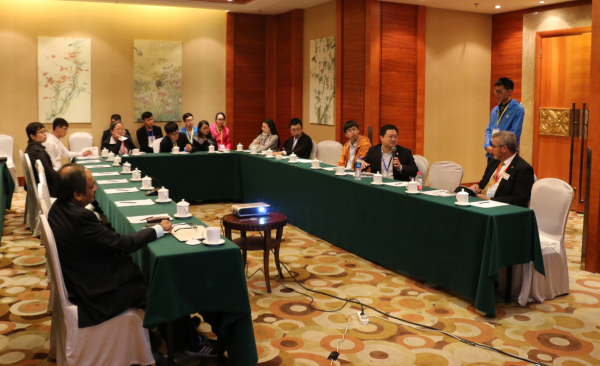C. Y. Chung, Member-at-Large (Global Outreach)
 It is an honor and a privilege for me to write this article to share my experiences and thoughts about the IEEE Power and Energy Society (PES) membership and global outreach. I have been a member of PES for more than 15 years. This society has provided me with various opportunities to grow both professionally and personally. In my opinion, PES is the most suitable platform for scholars and engineers to build professional networks and to share knowledge and build collaborative research projects in power and energy areas. I strongly suggest aspiring researchers and professionals make use of this platform to further advance their careers.
It is an honor and a privilege for me to write this article to share my experiences and thoughts about the IEEE Power and Energy Society (PES) membership and global outreach. I have been a member of PES for more than 15 years. This society has provided me with various opportunities to grow both professionally and personally. In my opinion, PES is the most suitable platform for scholars and engineers to build professional networks and to share knowledge and build collaborative research projects in power and energy areas. I strongly suggest aspiring researchers and professionals make use of this platform to further advance their careers.
The growing interest in the fields of smart grids and renewable energy has resulted in PES becoming an increasingly significant organization as these fields directly correlate to the fundamental objectives of PES. This society plays an important role in establishing standards and guidelines for future power systems as well as providing scholars and researchers opportunities to share their state-of-the-art works through conferences and papers. In this regard, PES membership has become very important for those connected to the advancement of the power systems. PES provides a strong platform that connects researchers and industry so as to realize the future power system. This connection is highly important to transfer the knowledge and research outcomes to the industry. Members of PES enjoy a wide array of benefits such as accessing technical information about epoch-making advancements in the field, opportunities to meet, network and collaborate with world-renowned scholars and engineers, and receiving significant discounts in PES sponsored or co-sponsored conferences and meetings. Furthermore, their contributions are recognized at each stage of their careers. One of the most important elements of PES membership is its student memberships. There has been a growing increase in student membership of PES. Students enjoy various benefits such as travel awards for attending conferences, reduced registration fees and much more. The number of PES student chapters and student memberships is expected to significantly grow in future. PES believes that today’s students are tomorrow’s leaders. Hence, PES has introduced various initiatives to promote the society among the students.
Although PES membership has been increasing over the past few years, there is room to further expand the outreach of this society in various countries. In response to the need to expand PES membership across the globe, IEEE PES Governing Board has formed a task force on membership expansion in Regions 8, 9 and 10. This task force, chaired by Prof. Miroslav Begovic (Past IEEE PES President) and myself, aims to:
- Identify the main obstacles to membership expansion in the targeted regions;
- Determine suitable strategies to address the identified obstacles; and
- Implement the strategic plans to increase membership and enhance the outreach in these regions.
In the first step, our focus is on increasing PES membership in China. After that, our attention will be devoted to other countries and cities in Region 10 and, finally, we will concentrate on expanding the PES membership in Regions 8 and 9 based on experiences gained in Region 10. Up to now, we have introduced the task force in several events such as IEEE PES Asia-Pacific Power and Energy Engineering Conference 2016 (APPEEC 2016) in Xian, China and the meeting of IEEE PES Chapter Chairs in China. In these meetings, we have identified certain initiatives, such as corporate membership, significant discounts for members compared with non-members for participation in PES activities, active involvement of local industries and usage of local languages in regional activities. The proper implementation of these initiatives can surely increase the outreach of PES in different parts of the world.

The power and energy sector is changing rapidly. In this regard, PES is expected to play a key role in providing technical leadership to industry and society. The need to expand PES membership and outreach will be more evident in the future, as researchers and professionals from all over the world will continue to participate in the advancement of power and energy sector. PES and its membership and outreach program will continue to bring together researchers and professionals from various parts of the world, all of whom share a common goal, which is the betterment of society through advancement in the field of power and energy systems.
Finally, I would highly appreciate any comments, suggestions and ideas that you believe can increase the membership and outreach of PES and also can benefit the current members of PES. I can be reached at c.y.chung@usask.ca.
